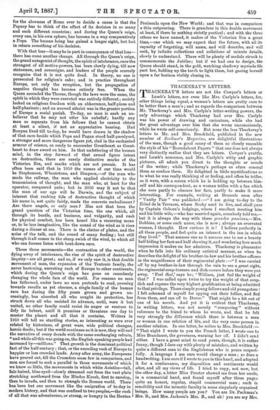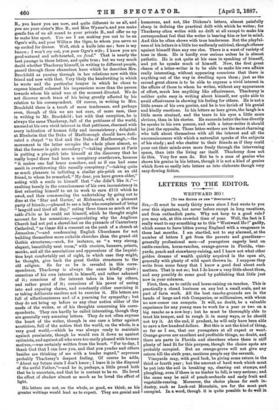THACICERAY'S LETTERS.
THACRERAY'S letters are not like Cowper's letters or Lamb's letters, nor even like Mrs. Carlyle's letters, for, other things being equal, a woman's letters are pretty sure to be better than a man's ; and as regards the comparison between Mr. Thackeray's and Mrs. Carlyle's letter-writing powers, the only advantage which Thackeray had over Mrs. Carlyle was his power of drawing and caricature, while she had the great advantage over him that she wrote unconsciously, while be wrote self-consciously. But none the less Thackeray's letters to Mr. and Mrs. Brookfield, published in the new number of Scribner's Magazine, are delightful illustrations of the man, though a good many of them so closely resemble the style of his "Roundabout Papers" that one does not always very distinctly realise that they are letters. Cowper's prattle, and Lamb's nonsense, and Mrs. Carlyle's witty and graphic pictures, all admit you direct to the thoughts or moods of the writer ; while Thackemy's perhaps as often conceal them as confess them. He delighted in little mystifications as to what he was really thinking of or feeling, and often he trifles, as it were, with a screen which he is holding up between him- self and his correspondent, as a woman trifles with a fan which she uses partly to obscure her face, partly to make it more interesting. For example, writing at Brussels soon after "Vanity Fair" was published :—" I am going to-day to the Hotel de la Terrasse, where Becky used to live, and shall pass by Captain Osborne lodgings, where I recollect meeting him and his little wife,—who has married again, somebody told me,— but it is always the way with these grandee passions,—Mrs. Dobbins, or some such name, she is now ; always an overrated woman, I thought. How curious it is I believe perfectly in all these people, and feel quite an interest in the inn in which they lived." That amuses one as it amuses one to see a beauty half hiding her face and half showing it,and wondering how much impression it makes on her admirers. Thackeray is pleasanter when he falls into his ordinary satirical manner, as when he describes the delight of his brother-in-law and his brother-officers in the magnificence of their regimental plate :—" I was carried off by my brother-in-law through the rain to see a great eight, the regimental soup-tureens and dish-covers before they were put away. Feel that,' says he; just feel the weight of that !' I was called upon twice to try the weight of that soup. dish and express the very highest gratification at being admitted to that privilege. Those simple young fellows and old youngsters ! I felt ashamed of myself for spying out their follies, and fled from them, and ran off to Dover." That might be a bit out of one of his novels. And yet it is evident that Thackeray, in writing letters, was not merely "composing" without reference to the friend to whom he wrote, and that be felt very strongly the difference which there is between a man or woman in one relation of life, and the very same person in another relation. In one letter, he writes to Mrs. Brookfield That night I wrote to you the French letter, I wrote one to Miss Brandaner, the governess, warning her off. I didn't send either. I have a great mind to send yours, though, it is rather funny, though I dare say with plenty of mistakes, and written by quite a different man to the Englishman who is yours respect- fully. A language I am sure would change a man ; so does a handwriting. I am sure if I wrote to you in this hand, and adopted it for a continuance, my disposition and sentiments would alter, and all my views of life. I tried to copy, not now, but the other day, a letter Miss Procter showed me from her uncle, in a commercial hand, and found myself after three pages quite an honest, regular, stupid commercial man ; such is sensibility and the mimetic faculty in some singularly organised beings. How many people are you P You are Dr. Packman's Mrs. B., and Mrs. Jackson's Mrs. B., and ah ! you are my Mrs.
II, you know you are now, and quite different to us all, and you are your sister's Mrs. B., and Miss Wynne's, and you make gentle fan of us all round to your private B., and offer us up to make him sport. You see I am making you out to be an Ogre's wife, and poor William the Ogre, to whom you serve us up cooked for dinner. Well, stick a knife into me ; here is my busam ; I won't cry out, you poor Ogre's wife ; I know you are good-natured and soft-hearted, an fond." That is nearly the best passage in these letters, and quite true ; but we very much doubt whether Thackeray himself, in writing to different people, passed through those chameleon hues which he describes Mrs. Brookfield as passing through in her relations now with this friend and now with that. Very likely the handwriting in which he wrote and the particular tongue in which he chose to express himself coloured his impressions more than the person towards whom his mind was at the moment directed. We do not discover much trace of his being greatly affected by his relation to his correspondent. Of course, in writing to Mrs. Brookfield there is a touch of more tenderness, and perhaps even, though of this we are not sure, of more ease, than in writing to Mr. Brookfield ; but with that exception, he is always the same Thackeray, full of the pettiness of the world, amused at his own vivid interest in that pettiness, charmed with every indication of human folly and inconsistency ; delighted at Blenheim that the Duke of Marlborough should have dedi- cated a chapel "to God and the Duke of Marlborough,—the monument to the latter occupies the whole place almost, so that the former is quite secondary ;"—taking pleasure at Paris in putting a pin-prick into himself at the discovery that he really hoped there had been a conspiracy overthrown, because "it makes one feel brave somehow, and as if one had some merit in overthrowing this rascally conspiracy ;"—taking quite as much pleasure in inflicting a similar pin-prick on an old friend, to whom he remarked," My dear, you have grown older," noting with a smile to himself that "she didn't like it ;"— exulting keenly in the consciousness of his own inconsistency in first exhorting himself to set to work to earn £112 which he owed, and then commencing the undertaking by going out to dine at the Star and Garter,' at Richmond, with a pleasant party of friends ;—pleased to see a lady who complained of being "languid and tired all day," eating three times as much at the fable d'hOle as he could eat himself, which he thought might account for her sensations ;—speculating why the Anglican Church had not put a shovel-hat on the pinnacle of Canterbury Cathedral, " as Omar did a crescent on the peak of a church at Jerusalem ;"—and condemning English Churchmen for not building themselves more suitable churches Alan the grand old Gothic structures,—such, for instance, as "a very strong, elegant, beautifully neat room," with croziers, banners, priests, monks, and all the associations and oppressions of the Inquisi- tion kept comfortably out of sight, in which case they might, be thought, give back the great Gothic structures to the old religion. So far as he is revealed in this corre- spondence, Thackeray is always the same kindly cynic ; conscious of his own interest in himself, and rather ashamed of it ; conscious of the interest taken in him by others, and rather proud of it ; conscious of his power of seeing into and exposing shams, and constantly either exercising it or taking deliberate resolves not to exercise it. His letters are fall of affectionateness and of a yearning for sympathy ; but they do not bring up before us any clear notion either of the needs of the writer, or of his thoughts concerning his corre- spondents. They can hardly be called interesting, though they are generally very amusing letters. They do not often express the heart of the writer, though in one ease a letter against asceticism, full of the notion that the world, on the whole, is a very good world,—which he was always ready to maintain against pessimists, though he would run it down as against optimists, and against all who were too easily pleased with human motives,—was certainly written from the heart. "For to-day, I thank God that I can love you, and that you yonder and others besides are thinking of me with a tender regard," expresses probably Thackeray'a deepest feeling. Of course he adds, "About my future state I don't know ; I leave it in the disposal of the awful Father,"—and he is, perhaps, a little proud both that he is uncertain, and that he is content to be so. He loved the effect of shadow almost as mach as he loved the effect of light.
His letters are not, on the whole, so good, we think, as his greater writings would lead us to expect. They are genial and humorous, and not, like Dickens's letters, almost painfully sharp in defining the practical drift with which he writes; for Thackeray often writes with no drift at all except to make his correspondent feel that the writer is bearing him or her in mind. And this he often shows with true tenderness. But the playful- ness of his letters is a little too uniformly satirical, though oftener against himself than any one else. There is a want of variety of tone in them. He is hardly ever serious unless he is almost pathetic. He is not quite at his ease in speaking of himself, and yet he speaks much of himself. Now, the first great charm of a letter-writer is to be able to make his own affairs really interesting, without appearing conscious that there is anything out of the way in dwelling upon them ; just as the second great charm is to be able to express a vivid interest in the affairs of those to whom he writes, without any appearance of effort, much less anything like effusiveness. Thackeray is neither quite easy in writing about himself, nor quite able to avoid effusiveness in showing his feeling for others. He is not a little aware of his own genius, and he is too lavish of his genial and kindly emotions. In his letters as here given, the laugh is a little more strained, and the tears in his eyes a little more obvious, than in his stories. He succeeds better the less directly he speaks in his own person, and with a letter-writer it should be just the opposite. Those letter-writers are the meet charming who talk about themselves with all the interest and all the unconsciousness with which a naturalist speaks of the subjects of his study ; and who chatter to their friends as if they could pour out their minds even more freely through the intervening space, than into the living ear itself. Thackeray does not do this. Very few men do. But he is a man of genius who shows his genius in his letters, though it is not a kind of genius which flows so easily into letters as into elaborate though very easy-flowing fiction.



































 Previous page
Previous page